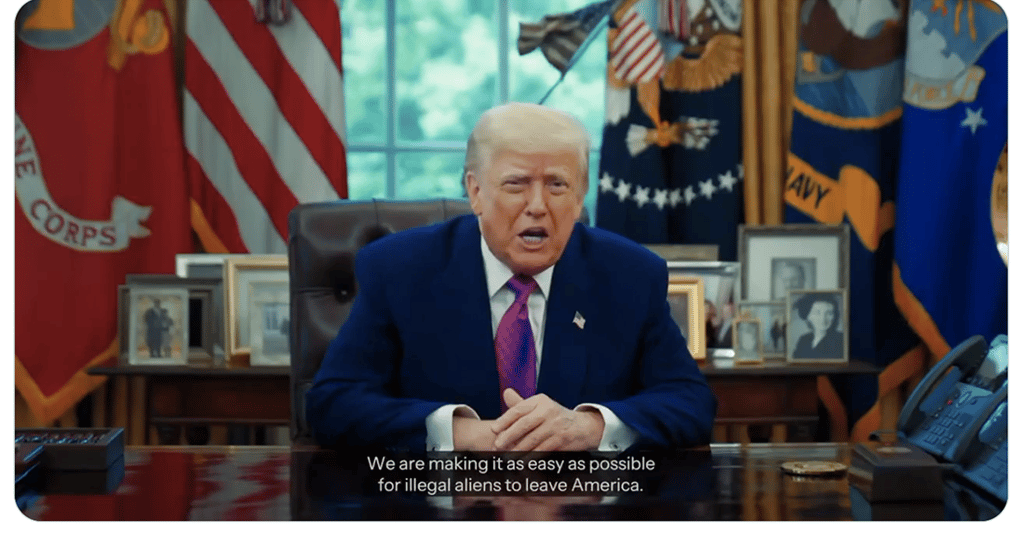Trump's Fictional Self-Deportation Plan: Satire or Policy Precedent?
5/4/20253 min read


Trump's Fictional Self-Deportation Plan: Satire or Policy Precedent?
In a surprising twist of political theater, a recent X post from Donald Trump's account announced a fictional executive order launching a "self-deportation program" for illegal immigrants. The post, complete with a video and dramatic subtitles, detailed an app called "CBP Home" where undocumented individuals could book free flights out of the country, all while facing dire consequences for staying. But is this just satire, or does it reflect deeper currents in U.S. immigration policy?
The video, shared on May 10, 2025, paints a picture of a government offering incentives like free flights and financial bonuses to encourage voluntary departure, juxtaposed with threats of severe penalties for those who remain. It's a narrative that blends elements of past policy proposals with hyperbole, sparking debates about the line between fiction and feasible policy.
The Satirical Edge
At first glance, the post seems like a piece of political satire, exaggerated to the point of absurdity. The idea of an app facilitating self-deportation, complete with a "dignified" exit strategy, feels more akin to a dystopian novel than real-world policy. Yet, the language used—terms like "sudden deportation" and "enormous financial penalties"—resonates with historical attempts to manage immigration through attrition and enforcement.
During the George W. Bush administration, the concept of "self-deportation" was floated as a strategy to reduce undocumented populations by making life so difficult that individuals would choose to leave voluntarily. This approach, however, was met with significant criticism for its humanitarian implications and lack of effectiveness. The Trump-era post, therefore, can be seen as a hyperbolic extension of these past efforts, leveraging technology and incentives in a way that borders on the fantastical.
Policy Precedents and Real-World Implications
Despite its fictional nature, the post taps into real policy precedents. The U.S. has a history of using technology to manage immigration, from the CBP One app used for asylum appointments to broader surveillance and tracking systems. The idea of incentivizing departure isn't entirely new either; monetary incentives have been discussed as a cost-effective alternative to mass deportation, though never implemented on the scale suggested.
Moreover, the threats of severe consequences for remaining illegally echo proposals like Arizona's SB 1070, which aimed to crack down on undocumented immigrants through state-level enforcement. While SB 1070 faced legal challenges and was partially struck down by the Supreme Court, it highlighted the ongoing tension between state and federal authority in immigration matters. The fictional executive order, therefore, isn't entirely divorced from the policy landscape; it exaggerates existing tensions and proposals.
The Role of Satire in Political Discourse
This incident raises interesting questions about the role of satire in political discourse. In an era where misinformation can spread rapidly, distinguishing between satire and serious policy proposals becomes crucial. The Trump post, with its detailed video and authoritative tone, could easily be mistaken for a genuine announcement, especially by those not familiar with the context. This blurring of lines underscores the importance of media literacy and critical thinking in consuming political content.
Satire, however, also serves a purpose. It can highlight the absurdity of certain policies or attitudes, prompting reflection and debate. In this case, the exaggerated self-deportation plan might force readers to consider the ethical and practical implications of such policies, even if presented in a fictional context.
Engaging Readers: Thought-Provoking Questions
As we navigate this intersection of fiction and policy, several questions emerge:
How do we balance the need for effective immigration management with humanitarian considerations?
Can technology like apps and incentives truly facilitate voluntary departure, or do they risk exacerbating existing inequalities?
What role should satire play in political discourse, and how can we ensure it doesn't contribute to misinformation?
Are there lessons from past "self-deportation" strategies that could inform future policy, or should we move away from such approaches entirely?
These questions invite readers to engage critically with the issues at hand, recognizing that the line between satire and policy is often thinner than it appears. Whether this post is a harmless jest or a reflection of deeper policy currents, it undoubtedly sparks a conversation worth having.
hello@boncopia.com
+13286036419
© 2025. All rights reserved.